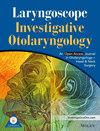3D reconstruction of vocal fold dynamics with laser high-speed videoendoscopy in children
Abstract
Objective
The objective of this study is to evaluate three-dimensional vertical motion of the superior surface of the vocal folds in vivo in (a) typically developing children as a function of vocal frequency variations and (b) a child with vocal nodules.
Methods
A custom developed laser endoscope coupled with high-speed videoendoscopy was used to obtain 3D parameters from 2 healthy children, one child with vocal nodules, and 23 vocally healthy adults (females = 11, males = 12). Parameters of amplitude (mm), maximum opening/closing velocity (mm/s), and mean opening/closing velocity (mm/s) were computed for the lateral and vertical vibratory motion along the anterior, middle, and posterior sections of the vocal folds were computed.
Results
We provide for the first time, absolute measurements of vertical amplitude and maximum/ mean velocity during the opening and closing phases, in vivo in children. Overall, the vertical motion was larger in vocally normal children compared with the lateral motion, especially along the visible posterior section of the vocal folds and during low pitch phonation. The opening phase dynamics were consistently large along the posterior section in the child with vocal nodules.
Conclusions
The study findings establish the feasibility of capturing 3D motion in a clinical setting and provide proof of concept for the application of the proposed 3D laser in the pediatric population. Future large sample size studies are needed to establish the diagnostic potential of examining the closing phase vertical motion to evaluate vibratory development in children with normal voice and investigating the opening phase vertical motion in children with nodules.
Level of Evidence
N/A.


 求助内容:
求助内容: 应助结果提醒方式:
应助结果提醒方式:


